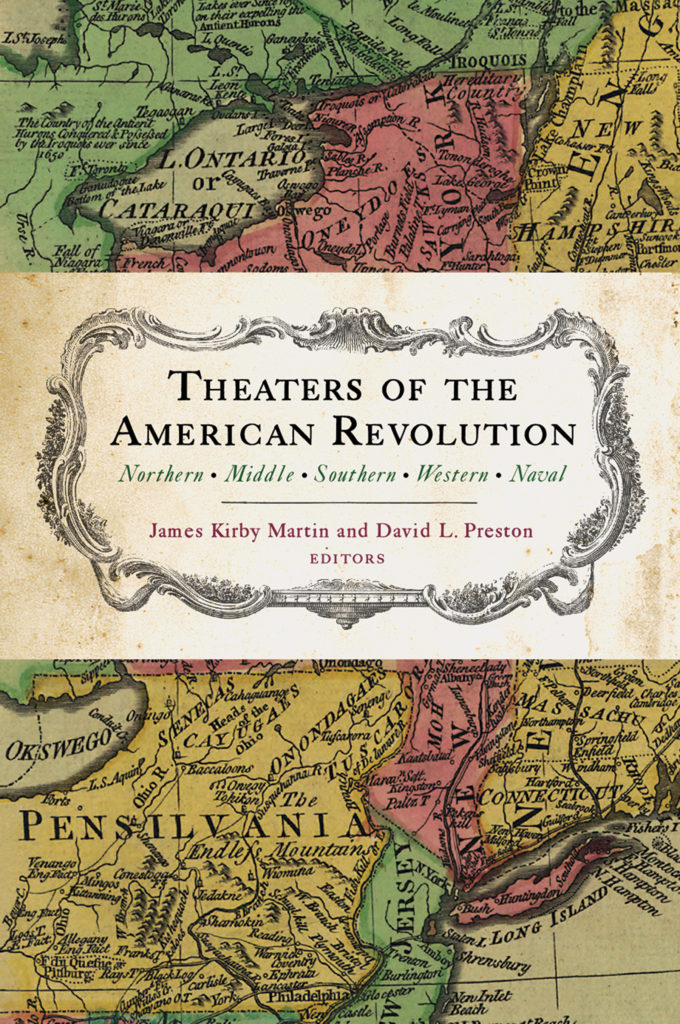

Theaters of the American Revolution
Northern, Middle, Southern, Western, Naval
$28.00 Add to Cart Save 25% on every book by joining our Book Club


Understanding the course of the American Revolution through geographical regions
Identifying discrete geographical areas in order to better understand a conflict that moves across hundreds of thousands of square miles of land and water, such as the American Civil War and World War II, has been a valuable historical method. During this time of greater study of the war that made America, the authors of Theaters of the American Revolution take this approach for the first time. The result is a stimulating volume that will allow readers to see how the war flowed from region to region from 1775 to 1781, beginning in the Northern colonies and Canada, through the dark months in the Middle colonies, to a shift to the South and culmination at Yorktown. Simultaneously, the war raged up and down the western frontier, with the Patriots working to keep the British and their Indian allies from disrupting the main battle armies to the east. Equally important was the war at sea, where American privateers and a fledgling navy attempted to harass the British; but with the entrance of France to the conflict, the control of the sea took a much more balanced—and important— aspect. With specially commissioned maps and colorful descriptions of eighteenth century American terrain, settlements, and cities, as well as key battles, Theaters of the American Revolution provides an ideal introduction to understanding one of the most important wars in world history in its totality.
Contents: Introduction–James Kirby Martin and David L. Preston • The Northern Theater–James Kirby Martin • The Middle Theater–Edward G. Lengel and Mark Edward Lender • The Southern Theater–Jim Piecuch • The Western Theater–Mark Edward Lender • The Naval Theater–Charles Neimeyer
James Kirby Martin is Emeritus Professor of History at the University of Houston. Among his many books are Insurrection: The American Revolution and Its Meaning, Benedict Arnold, Revolutionary Hero: An American Warrior Reconsidered, and, with Mark Edward Lender, A Respectable Army: The Military Origins of the Republic, 1763–1789.
David L. Preston is the Westvaco Professor of National Security Studies at The Citadel. He is the author of Braddock’s Defeat: The Battle of the Monongahela and the Road to Revolution, winner of the 2015 Guggenheim-Lehrman Prize in Military History, and The Texture of Contact: European and Indian Settler Communities on the Frontiers of Iroquoia, 1667-1783.
Mark Edward Lender has written extensively on early American social and military history and is a recognized authority on the War for Independence, including Cabal! The Plot Against General Washington. Lender’s scholarship has won awards from the Society for Military History and the U.S. Army Historical Foundation and a fellowship from the Smith National Library at George Washington’s Mount Vernon. In 2017 he was a finalist for the prestigious George Washington Literary Prize.
Edward G. Lengel is author of Inventing George Washington: America’s Founder, in Myth and Memory and General George Washington: A Military Life, finalist for the George Washington Book Prize. As Editor-in-Chief of the Papers of George Washington project at the University of Virginia, he was awarded the National Humanities Medal.
Charles Neimeyer is the Director and Chief of Marine Corps History at Marine Corps University, Quantico, Virginia. He has taught at the United States Naval Academy, the University of Maryland, and Georgetown University and is the author of America Goes to War: A Social History of the Continental Army, 1775–1783.
Jim Piecuch is the author of The Battle of Camden: A Documentary History, Three Peoples, One King: Loyalists, Indians, and Slaves in the Revolutionary South, and editor of Cavalry in the American Revolution.
“This is a compact, highly readable introduction to the military history of the American Revolution. Well illustrated and with historical as well as modern maps to orient the reader, this book fills an important need for single-volume treatment of the war and of the inter-connectedness of the theaters of operation.”—On Point
“Taken together, these six contributions provide a concise introduction to the events that transpired in these distinct geographic settings or theaters. Rather than covering individual campaigns or battles, the authors have produced a readable, understandable account of this important war.”—Choice